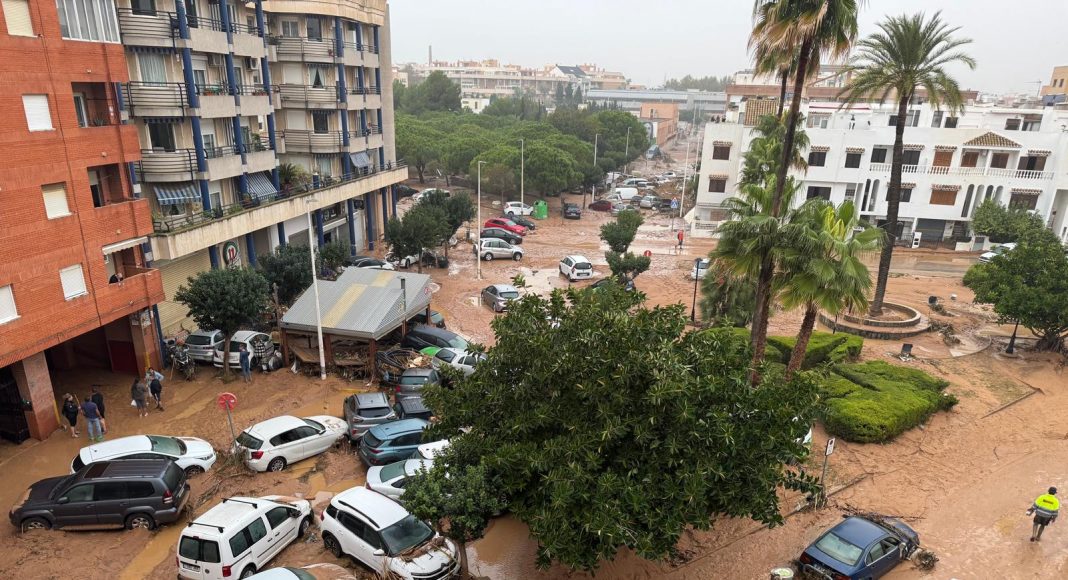Between 29 October and 13 November one of the deadliest natural disasters in Spanish history brought over a year’s worth of precipitation to the east and south of Spain, including the Valencian Community, Castilla La Mancha and Andalusia.
Locally known as DANA (a Spanish acronym for high-altitude isolated depression), this phenomenon is an intensified version of what is called ‘cold drop’, which occurs when a mass of warm air collides with a stagnant mass of cold air at high altitude.
Although DANAs are common in Spain during the autumn months – when polar air currents collide with masses of warm air from the Mediterranean – climate change increases the destructive power of the phenomenon. As the Mediterranean Sea reaches record high temperatures, these disasters will become more frequent and more extreme.
Adding up to nearly 500 litres per square metre in some areas, torrential rainfall caused flash floods and devastating human and material damage. 226 people died, most of them in localities with no rain due to the wide reach of the floods and construction in flood-prone zones, and 14 are still missing. Cars piled up after being swept away, a bridge collapsed and dozens of towns were covered in mud as the result of the floods, which had such catastrophic effects due to various factors.
Disaster caused by capitalism
In Spain there are currently 2.7 million people living in areas at high risk of flooding. Three out of ten affected homes in the Valencian Community, built during the real estate boom which peaked in 2007-2008, fall under this category, and many developed areas considered not floodable were also hit by the floods. Capitalism’s greed for profit has once again cost hundreds of lives and damages to over 100,000 homes, widely inhabited by the working class.
Government’s response
In the context of the climate crisis, and despite repeated reports and warnings from the scientific community around climate change and risks of flooding in the regions of the Mediterranean, the current government of the Valencian Community failed its people. Only four months after being elected, President Carlos Mazón’s government – which started as a coalition of the conservative People’s Party and far-right Vox, but broke off after a year as Vox ‘moved to the opposition’ – dissolved the Valencian Emergency Unit, a body inherited from the previous administration and intended to ensure rapid intervention in the event of a meteorological or seismic emergency.
Not only was the regional government completely unprepared to deal with this disaster, but its response was dismissive, delayed and insufficient. AEMET, the state meteorological agency, warned authorities and the public six days before the catastrophe occurred that a DANA was forming by the Iberian Peninsula and two days before that there was a 70% chance of torrential rain. At 7.30am on the day of the disaster, it issued a red alert for severe weather and warned people in the region to stay at home unless strictly necessary and away from riverbeds and floodable areas. Serious warnings continued throughout the day, while images of towns starting to flood were already being circulated on social media. At 1pm Mazón claimed publicly that the storm was moving and its intensity would decrease in the region by 6pm. Businesses made staff go to work and schools carried on lessons as usual. An hour later, a transport worker for Mercadona, a well-known Spanish supermarket chain, was reported missing. The government’s civil protection did not issue a warning until 8pm that day, ten hours after AEMET’s red warning and eight after the first ravines overflowed.
The aftermath
While regional and national government entered a blame game, emergency services and security units collapsed, people reported missing reached the thousands and bodies started to appear. The people of Valencia were left with no other choice than to organise in solidarity and mutual aid. Aid brigades were coordinated on social media from across the country, helping to clear mud and debris in villages, salvage damaged belongings and deliver essential supplies to those affected. Water bottles donated by multi-national corporations like Nestlé and Danone signify deep contradictions in water management as the same companies are responsible for exacerbating water scarcity and drought conditions that negatively impacted the soil’s ability to absorb flood waters.
With solidarity also came anger. The king and queen of Spain were pelted with mud and other objects by angry residents during a visit to Paiporta, one of the worst-affected towns. Citizens also pelted objects at Prime Minister Pedro Sánchez and Valencia’s city hall was smeared with mud and sprayed with the words ‘Mazón murderer’. 130,000 protested in the streets of Valencia demanding Mazón’s resignation and imprisonment for his role in the tragedy.
The impact of the disaster is still very much present, missing people are still to be found, and protests are still being organised. While the right tries to capitalise and use this catastrophe to its advantage by blaming the national, more ‘progressive’ government, the Spanish working class must recognise that there is no policy or administration under capitalism that does not lead to climate disaster. It is the capitalist system which allowed construction in flood-prone areas, which dismantled the regional emergency unit, which systematically ignores reports and warnings on climate change and which did not issue an official warning until the end of the working day. These are no longer rare events but real consequences of capitalism and imperialism’s destruction of the planet. Only an alternative system that puts the needs of the people and the environment before profit can be truly sustainable.
Capitalism is extinction, socialism is survival!
Luna Blue




